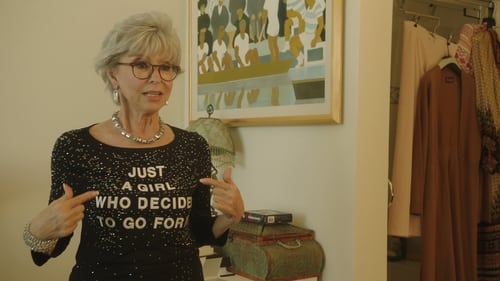Frances Negrón Muntaner
出生 : 1966-01-01, Santurce, Puerto Rico
略歴
Frances Negrón-Muntaner (born 1966 in San Juan, Puerto Rico) is an award-winning Puerto Rican filmmaker, writer, and scholar. Her work is focused on a comparative exploration of coloniality, primarily in Puerto Rico and the United States, with special attention given to the intersections between race, ethnicity, gender, sexuality, and politics. She is an associate professor of English and Comparative Literature and Director of the Center for the Study of Ethnicity and Race at Columbia University in New York City.

Self
Rita Moreno defied both her humble upbringing and relentless racism to become one of a select group who have won an Emmy, Grammy, Oscar and Tony Award. Over a seventy year career, she has paved the way for Hispanic-American performers by refusing to be pigeonholed into one-dimensional stereotypes.

Herself
A one-hour, non-partisan program in English and Spanish encouraging Latinos to vote. It features inspiring stories of leading Latino celebrities and media personalities such as María Celeste Arrarás, Prince Royce, Jorge Ramos and Adrienne Bailon, who are on a mission to make the voice of the Latino community heard in 2016.

Producer
The story of the native people of Guam, the Chamorros, who remained loyal to the U.S. under a brutal Japanese occupation only to be stripped of much of their ancestral lands to build military facilities after World War II. Through rarely seen archival footage, as well as testimonies of survivors and their descendants, War for Guam explores the experience and enduring legacy of World War II on the island.

Writer
The story of the native people of Guam, the Chamorros, who remained loyal to the U.S. under a brutal Japanese occupation only to be stripped of much of their ancestral lands to build military facilities after World War II. Through rarely seen archival footage, as well as testimonies of survivors and their descendants, War for Guam explores the experience and enduring legacy of World War II on the island.

Director
The story of the native people of Guam, the Chamorros, who remained loyal to the U.S. under a brutal Japanese occupation only to be stripped of much of their ancestral lands to build military facilities after World War II. Through rarely seen archival footage, as well as testimonies of survivors and their descendants, War for Guam explores the experience and enduring legacy of World War II on the island.

Producer
Portrays how the smallest city of Massachusetts, of mostly Latino working class residents, provided the key leadership for the approval of the Transgender Equal Rights Act of the state.

Writer
Portrays how the smallest city of Massachusetts, of mostly Latino working class residents, provided the key leadership for the approval of the Transgender Equal Rights Act of the state.

Director
Portrays how the smallest city of Massachusetts, of mostly Latino working class residents, provided the key leadership for the approval of the Transgender Equal Rights Act of the state.

Self
Documentary that highlights 18 women and covers a period of time from the 50's to the 90's. The women chosen were selected because they represent the real diversity within both feminism and independent film and video. They range in age from 65 to 25. They are black, white, Puerto Rican, Yugoslavian, Asian American, biracial. They are straight, gay and bisexual. What they share is a need to express their own interpretations of what American culture is and could be and a belief that this work is made particularly powerful through the media.

Producer
The intertwined stories of the filmmaker's search for cultural belonging and a group of squatters' struggle for housing.

Writer
The intertwined stories of the filmmaker's search for cultural belonging and a group of squatters' struggle for housing.

Director
The intertwined stories of the filmmaker's search for cultural belonging and a group of squatters' struggle for housing.

Claudia
Contemplates the notion of "identity" through the experiences of a Puerto Rican woman living in the US. In a wonderful mix of fiction, archival footage, processed interviews and soap opera drama, the film tells the story of Claudia Marin, a middle-class, light-skinned, lesbian Puerto Rican photographer / videographer who is attempting to construct a sense of community in the US. Confronting the simultaneity of both her privilege and her oppression, this experimental narrative becomes a meditation on class, race, and sexuality as shifting differences.

Producer
Contemplates the notion of "identity" through the experiences of a Puerto Rican woman living in the US. In a wonderful mix of fiction, archival footage, processed interviews and soap opera drama, the film tells the story of Claudia Marin, a middle-class, light-skinned, lesbian Puerto Rican photographer / videographer who is attempting to construct a sense of community in the US. Confronting the simultaneity of both her privilege and her oppression, this experimental narrative becomes a meditation on class, race, and sexuality as shifting differences.

Writer
Contemplates the notion of "identity" through the experiences of a Puerto Rican woman living in the US. In a wonderful mix of fiction, archival footage, processed interviews and soap opera drama, the film tells the story of Claudia Marin, a middle-class, light-skinned, lesbian Puerto Rican photographer / videographer who is attempting to construct a sense of community in the US. Confronting the simultaneity of both her privilege and her oppression, this experimental narrative becomes a meditation on class, race, and sexuality as shifting differences.

Director
Contemplates the notion of "identity" through the experiences of a Puerto Rican woman living in the US. In a wonderful mix of fiction, archival footage, processed interviews and soap opera drama, the film tells the story of Claudia Marin, a middle-class, light-skinned, lesbian Puerto Rican photographer / videographer who is attempting to construct a sense of community in the US. Confronting the simultaneity of both her privilege and her oppression, this experimental narrative becomes a meditation on class, race, and sexuality as shifting differences.

Producer
A documentary on the socioeconomic and cultural context of the AIDS epidemic in a Latino Philadelphia neighborhood.

Writer
A documentary on the socioeconomic and cultural context of the AIDS epidemic in a Latino Philadelphia neighborhood.

Director
A documentary on the socioeconomic and cultural context of the AIDS epidemic in a Latino Philadelphia neighborhood.

Producer
The story of how a small community in the Puerto Rican island of Vieques won the battle against the U.S. Navy's contaminating practices in 2003—but is still fighting. This time for a safe environment as the military remains immune to prosecution and free of responsibility in Vieques' ongoing health crisis.

Writer
The story of how a small community in the Puerto Rican island of Vieques won the battle against the U.S. Navy's contaminating practices in 2003—but is still fighting. This time for a safe environment as the military remains immune to prosecution and free of responsibility in Vieques' ongoing health crisis.

Director
The story of how a small community in the Puerto Rican island of Vieques won the battle against the U.S. Navy's contaminating practices in 2003—but is still fighting. This time for a safe environment as the military remains immune to prosecution and free of responsibility in Vieques' ongoing health crisis.


